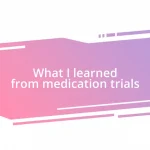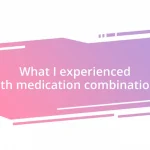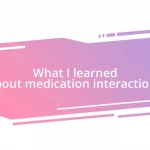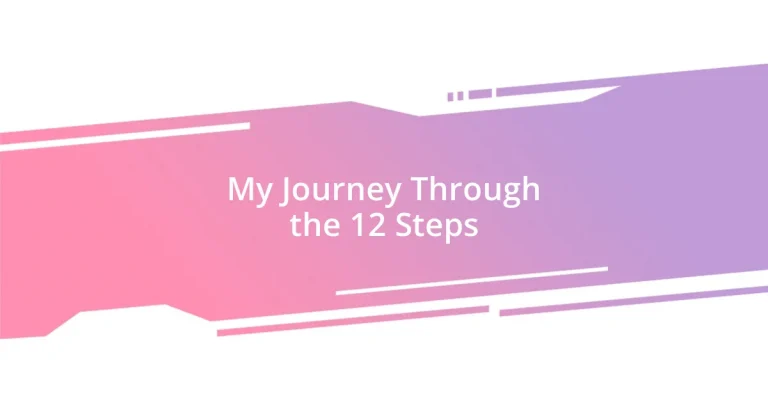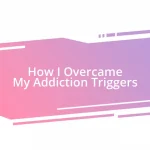Key takeaways:
- The 12 Steps serve as a flexible and profound journey toward self-discovery, allowing for deep emotional exploration and ongoing growth.
- Personal motivation for change often stems from self-realization, community support, and transformative experiences like grief, offering a source of strength and purpose.
- Sustaining long-term recovery relies on maintaining connections with others, sharing experiences, and setting achievable goals that foster a sense of direction and fulfillment.
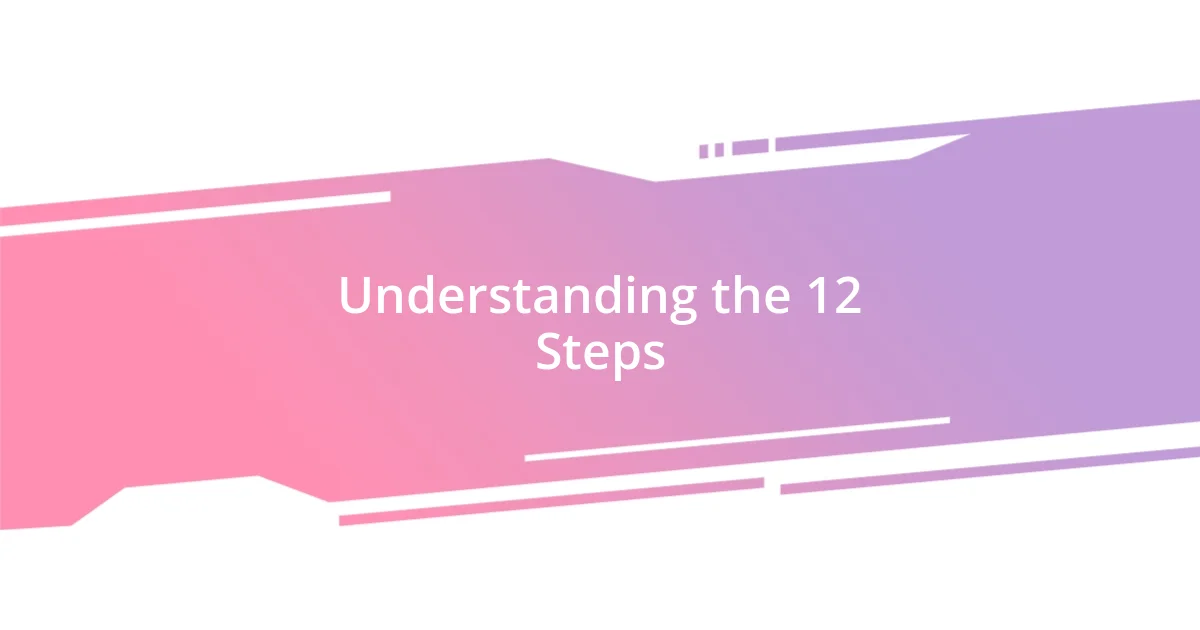
Understanding the 12 Steps
The 12 Steps are more than just a checklist; they represent a profound journey toward self-discovery and healing. When I first stumbled upon these steps, I felt both curious and skeptical. How could a simple set of principles guide someone through the maze of addiction? With time, I realized that each step is designed to peel back layers of denial and introspection, prompting us to take a closer look at our motives and behaviors.
As I worked through the steps, particularly the fourth and fifth, I encountered a whirlwind of emotions. It was like opening a floodgate of past experiences that I had long buried. Have you ever faced your demons head-on? It’s both terrifying and empowering, and there’s something indescribable about sharing these truths with someone you trust. In those moments, I felt an immense weight lift, as if admitting my faults was the first step toward genuine forgiveness.
Moreover, understanding the 12 Steps means recognizing that it’s not a linear process; it’s a spiral of growth. Each revisit to a step can reveal deeper insights and new motivations. I often find myself reflecting on my progress, sometimes marveling at how far I’ve come while reminding myself that the journey is ongoing. The beauty of the 12 Steps lies in their flexibility—each individual’s experience will dive into different layers of understanding, akin to a tapestry woven with unique threads of personal history and transformation.
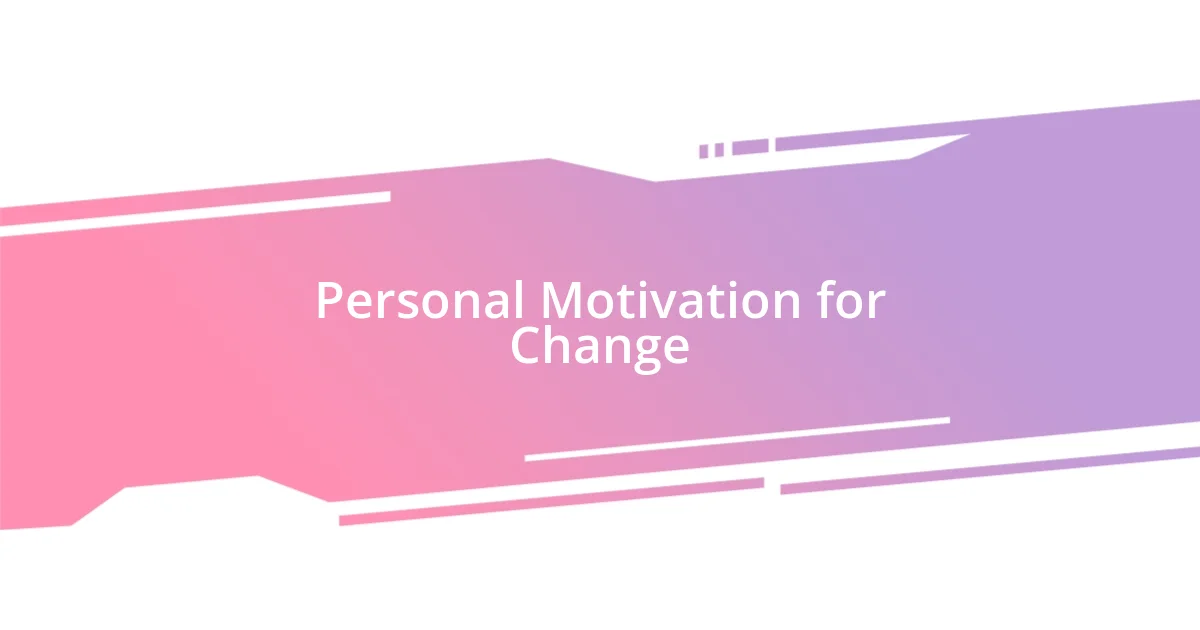
Personal Motivation for Change
When it comes to personal motivation for change, I find that it often springs from a deep desire to reclaim my life. One moment that stands out to me was when I caught a glimpse of myself in the mirror—it was as if I was looking at a stranger. That jarring realization ignited a fire within me. I understood then that the journey through the 12 Steps was not just an option; it was a necessity for my survival and peace of mind.
Throughout my path, I realized that change requires a supportive environment. I remember attending my first group meeting, feeling nervous yet hopeful. The shared stories of resilience from others resonated with me, pushing me to confront my own challenges. Listening to them made me realize I was not alone; their courage fueled my resolve to change. Did you ever feel inspired by someone else’s struggles? It’s an empowering experience that propels you forward.
As I delved deeper into the 12 Steps, I found that motivation can come from an unexpected place—grief. The loss of a loved one was a wake-up call, prompting me to not only honor their memory but also to transform my own narrative. This heartbreak sparked a commitment to live authentically, knowing that every step I took was a tribute to those I loved. This personal connection to loss and purpose can be a powerful catalyst for transformation, reminding us that our journey is deeply intertwined with the lives of others.
| Motivation Source | Personal Insight |
|---|---|
| Self-Realization | Seeing a stranger in the mirror ignited my journey. |
| Community Support | Group meetings showcased the strength in shared stories. |
| Grief | Loss compelled me to live authentically, honoring those I’ve lost. |
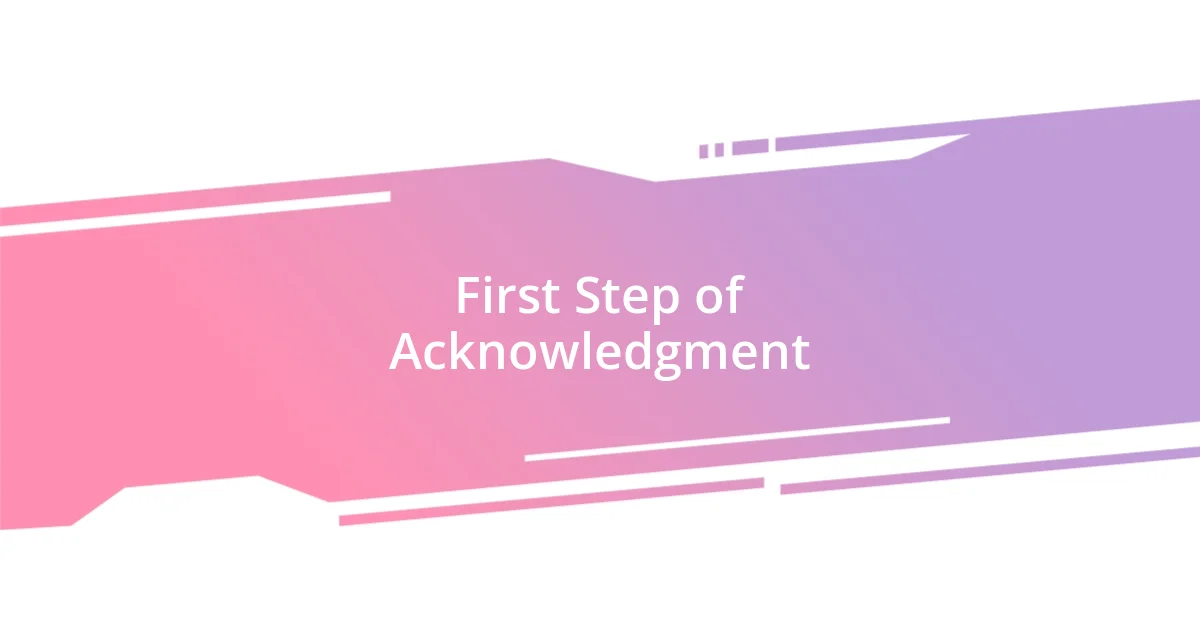
First Step of Acknowledgment
The first step of acknowledgment is the doorway to transformation. I can vividly recall the moment I uttered my first admission to myself: “I have a problem.” It felt surreal, almost like saying the words aloud made the reality tangible. There was a mix of fear and relief; acknowledging my struggles meant I could no longer hide behind denial. In that moment, I realized that recognizing my situation was the practical foundation for change.
When I began this journey, I understood that acknowledgment is more than a mere declaration; it is an act of bravery. Here are some insights that emerged for me:
- Emotional Release: Saying it out loud relieved an overwhelming sense of burden.
- Courage to Change: Facing my demons head-on was a decisive moment in my journey.
- Sparking Support: Inviting others into my acknowledgment created a network of safety and understanding.
Each of these realizations reminded me that this step could catalyze deeper exploration and growth—something I desperately needed. Without that recognition, the path forward would remain shrouded in shadows.
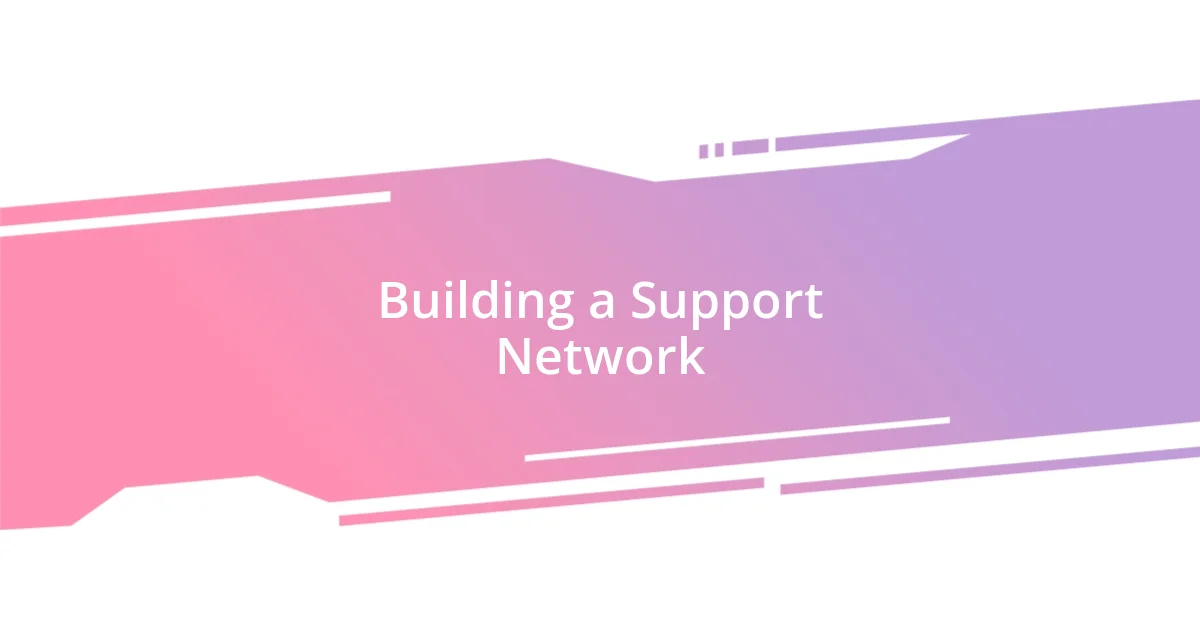
Building a Support Network
Building a support network was a game changer for me during my journey. I remember reaching out to old friends who I had distanced myself from; their willingness to listen and empathize brought warmth back into my life. Isn’t it incredible how reconnecting with others can ease the burden of isolation?
As I dove deeper into the community aspect of recovery, I discovered that surrounding myself with like-minded individuals was crucial. Joining a local fellowship group felt daunting at first, but those meetings quickly became a safe space where I could freely share my fears and joys. Have you ever experienced the freedom of being truly heard? For me, that was the lightbulb moment when I realized I wasn’t navigating this path alone.
The power of shared experiences cannot be underestimated. I learned that everybody in my support circle had their own battles, and hearing their stories revealed a tapestry of resilience and hope. Each encounter felt like a thread weaving me closer to my newfound purpose. Building a support network isn’t just about finding help; it’s also about discovering connections that encourage personal growth and joy.

Exploring Higher Power Concepts
Exploring the concept of a higher power was initially puzzling for me. I wondered, “What does it even mean to have a higher power?” I remember sitting quietly one afternoon and letting my thoughts drift. To my surprise, I didn’t see a divine figure but rather a sense of peace and purpose that enveloped me. It helped me understand that a higher power could be as simple as nature, community, or the collective wisdom of those around me.
As I delved further into this idea, I came to realize that defining my higher power was a personal journey. The more I explored, the more I felt liberated. I started seeing my higher power not as an external entity, but as the strength within and around me. This shift was profound; I used to fear surrendering control, but I discovered that embracing this concept gave me newfound courage to face daunting challenges head-on. Have you ever felt that moment when everything just clicks?
The conversations I had about this topic were illuminating. I recall a night at a support group where someone voiced their secular understanding of a higher power as a “force for good.” Their simple perspective struck a chord with me. It made me think about my own life and the goodness I encountered each day, whether through kindness from others or moments of clarity that nudged me towards growth. Connecting these dots revealed a comforting truth: it’s okay for the concept of a higher power to evolve with me throughout my recovery journey.
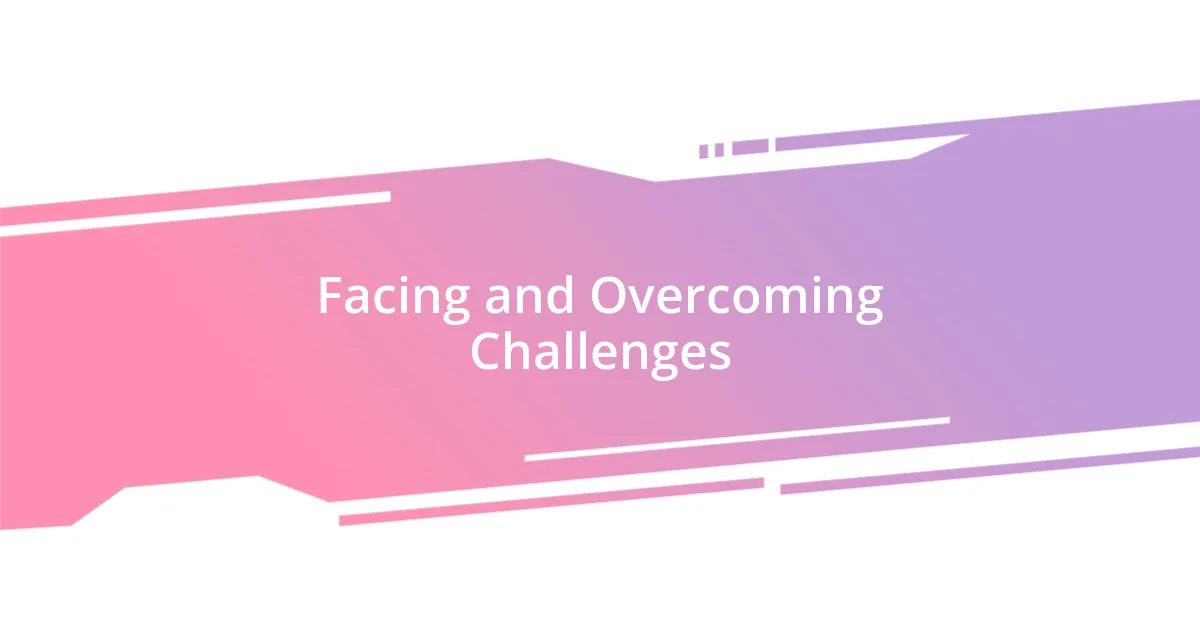
Facing and Overcoming Challenges
Facing challenges during my recovery felt like standing at the edge of a cliff, peering into the unknown. I remember feeling overwhelmed when I first encountered the deep-rooted fears that had kept me trapped for so long. It was in that moment of uncertainty that I learned the importance of acknowledging my feelings instead of burying them. Have you ever felt the weight of fear and suddenly realized that facing it can lead to relief? I found that by confronting my fears rather than avoiding them, I could reclaim a part of myself that I thought was lost.
One significant hurdle I had to overcome was the temptation to revert to old habits during times of stress. I recall a particularly challenging week—work deadlines were looming, and I felt overwhelmed. Instead of succumbing to those urges, I reached for my journal. Writing became my outlet to process my emotions and strategize my next steps. Have you ever noticed how putting your thoughts on paper can bring clarity? That simple act helped ground me when everything else felt chaotic.
Each step forward has come with its fair share of challenges, but I learned that resilience is built through those very struggles. There were days when I felt like giving up, like a wave crashing against a rocky shore, but each time, I found a little strength to rise again. I came to appreciate that growth often resides in discomfort. Have you experienced that transformative moment when pain turns into purpose? It’s a reminder that every setback can be a stepping stone toward a more profound understanding of oneself.
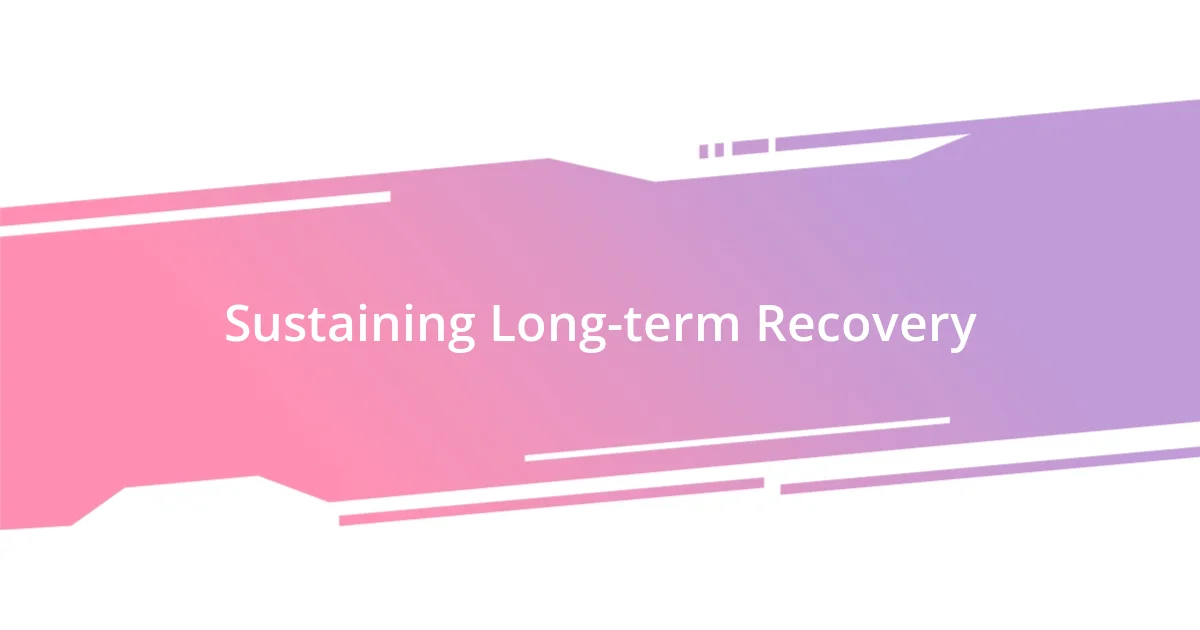
Sustaining Long-term Recovery
Sustaining long-term recovery is a dynamic process that requires continuous effort and self-awareness. I can’t stress enough the importance of staying connected with others in recovery. During my journey, I made it a priority to engage in regular check-ins with my support network. There were times when I felt like I could go it alone, but reaching out always reminded me that I wasn’t isolated in my struggles. Have you ever felt a wave of relief after sharing your thoughts with someone who understands?
One pivotal moment was when I attended a recovery weekend retreat. The experience was eye-opening; I realized that sharing stories with others reinforced my commitment to stay on track. I found immense value in the shared wisdom and the collective strength of the group. It illuminated how these connections are not just helpful but essential. Have you ever discovered that the simplest interactions can profoundly shape your path?
Moreover, I learned the significance of setting personal goals. They don’t have to be grand or life-altering, but small, achievable steps can create a sense of purpose and direction. I remember deciding to start volunteering at a local community center. This small commitment not only filled my time positively but also kept me grounded, reminding me of the importance of giving back. It’s fascinating how helping others can simultaneously help us heal. Have you ever found that serving others elevated your own spirit as you navigate your recovery?


